- Home
- Steven Brust
Dragon Page 3
Dragon Read online
Page 3
My reverie was interrupted by Kragar saying, "Uh … Boss? Where are we going?"
"Good question." Most sorcerers would work either in a basement, where it's most reasonable to put any heavy objects they might need, or up in a tower, where there is less risk of wiping out the whole house if something goes wrong. In Baritt's case, probably some random room in a random place because it was convenient.
Loiosh moved nervously on my shoulder. We left the foyer and entered a sitting room of some sort, with more blown glass and decanters just like the others except full. On the wall to my left was a large oil of Baritt, looking imposing and dignified. There was a small door at the far end that should have led to the kitchen, and hallways heading off to the right and the left; one would presumably lead up a set of stairs to the bedchambers, the other to the rest of this floor. We took the one to the right and found a wide, straight stairway of polished white stone. We went back and tried the other hall, which looked more promising.
"Hey, Boss."
"Yeah, Loiosh?"
"There's something funny. I'm getting a feeling. It's like—"
"We're being watched, Vlad," said Kragar.
"Not really surprising," I said.
"I noticed first."
"Shut up."
"Ignore it, I think," I told Kragar. "It would be odd if no one had any surveillance spells. Should we try that door?"
"The big ironbound one with the rune carved on it, barred by a pair of Dragonlords with spears crossed in front of it? Why should it be that one?"
"You're funny, Kragar. Shut up, Kragar."
"Who are you, and what is your business?" said one of the guards, standing like a statue, her spear not moving from its position in front of the door.
"You know both answers," I told her.
She twitched a smile, which made me like her. "Yeah, but I have to ask. And you have to answer. Or you could leave. Or I could kill you."
"Baronet Taltos, House Jhereg, on an errand from Lord Morrolan, and for a minute there I liked you."
"I'm crushed," she said. Her spear snapped to her side; her companion's also moved, and the way was clear. She said, "Be informed that there is a teleport block in place around the house in general, and that it has been strengthened for that room."
"Is that a polite way of telling me not to try to steal anything?"
"I hadn't intended to be polite," she said.
I said, "Let's go."
"After you," said Kragar. Both guards twitched and then looked at him, as if they hadn't noticed him before, which they probably hadn't. Then they pretended they'd seen him all along, because to do anything else would have been undignified.
There didn't seem to be any way out of it, so I pulled back the bolt and opened the door.
There's a story, probably apocryphal but who cares, about Lishni, the inventor of the fire-ram. It seems he invented it out of desperation, having no other way for his flotilla of six cutters to escape a fleet of eight brigs and two ships of the line that had cut him off during what started as a minor action in one of the wars with Elde. As the story goes, after arming his cutters with his new invention, he went out, sank seven of the ten ships and damaged the other three, then, in another moment of inspiration, took his crews ashore, captured the Palace, and forced an unconditional surrender that ended the war right there. As he walked out of the Palace with the signed surrender in his hand, one of his subordinates supposedly asked him how he felt. "Fine," he said.
As I say, I very much doubt it happened like that, but it's a good story. I bring it up because, if someone had asked me how I felt when I walked into a room full of more Morganti weapons than I had thought existed in the world, I'd have said, in the same way, "Poorly."
"Boss … "
"I know, Loiosh."
The weapons were piled everywhere. It was like stepping into a room full of yellowsnakes. I could feel the two Dragonlords behind me, and even the knowledge that I was showing fear in front of them couldn't propel me forward.
"This is pretty ugly, Vlad."
"Tell me about it, Kragar."
"I wonder what he wanted them for."
"I wonder why the Serioli invented them in the first place."
"You don't know, Vlad?"
"No. Do you?"
"Sure. Well, I know what they say, at least."
"What do they say?"
"Back before the beginning of the Empire they were invented by a Serioli smith in order to make war so horrible no one would fight anymore."
I snorted. "You're kidding. Do you believe they could be that stupid?"
"Oh, but it worked."
"Huh?"
"Among the Serioli."
"Oh."
"Shall we go in?"
"I don't think I can."
"That's a problem."
"Yes."
We stood there like idiots for a little longer.
"Should we leave, then?" he asked.
"No, dammit."
"All right."
Hours and hours went by. All right, maybe a minute. The worst part was knowing those Dragonlords were right behind me. Showing fear in front of a Jhereg is bad business; showing fear in front of a Dragon hurts my pride.
Kragar said, "I have an idea."
"Good," I said. "I accept. An excellent idea. Whatever it is."
"This will take a couple of minutes."
"Even better. You think I'm in a hurry?"
Kragar's brow wrinkled. I suspected psychic contact.
"All right," he said. "He'll be here."
"Who?"
"Someone who can help. I met him some years ago when I was—it doesn't matter."
He might as well have completed the sentence. Kragar wasn't born into the Jhereg—he'd once been a Dragonlord himself—and whatever reasons he had for not being one anymore were his own business.
"What's his name?"
"Daymar. He's a Hawklord."
"All right. How can he help?"
"Psychics."
"What about them?"
"He's very good. He can do things with the powers of his mind that skilled sorcerers can't do using the power of the Orb. He—just a minute." He stepped out of the room for a moment and spoke quietly with the guards. When he returned, there was a thin, sharp-featured Dragaeran with him, all in black, with a sort of dreamy, vague expression on his face that was quite at odds with his features and with other Hawklords I'd known.
"Hello, Kragar," he said in a low, quiet voice.
"Hello, Daymar. This is my boss, Vlad."
He bowed politely, which also set him apart from others of his House. "Pleased to meet you," he said.
"And you," I told him.
He studied the room. "Very impressive," he said. "I've never seen so many at once."
"I was thinking much the same thing," I said.
Kragar said, "Can you, uh, tone them down a little? Vlad is a bit sensitive to their aura."
He turned to me with a look of curiosity. "Really? That's interesting. I wonder why?"
I refrained from saying, "Because I'm an Easterner with a superstitious dread of the damned things"; instead I just shrugged.
"Mind if I find out what it is about you that—"
"Yes," I said.
"All right," he said, appearing to be a little hurt. Then he looked around the room again. "Well," he said, "it shouldn't be difficult," and, just like that, I felt better. Not good, mind you, but better—it was as if they were still out there, and still hungry, but much farther away.
"How did you do that?" I said.
Daymar frowned and pursed his lips. "Well," he said, "if we consider the aura emitted by each weapon as a spherical field of uni—"
"Psychics," said Kragar.
I walked into the room as if there was nothing to it, and began looking around. Kragar and Daymar stayed behind me.
The weapons were a bit more arranged than I'd first thought—they were stacked, rather than just lying around, and they
were all in sheaths or scabbards—I tried not to think of how it would feel if they'd been naked. I couldn't, however, discern exactly what the order or arrangement was.
"The most powerful are at this end," said Daymar conversationally, "and the weakest are down there. That's a Jhereg on your shoulder, isn't it?"
"Psychics," I said. "And a keen eye for detail as well," I added.
"Excuse me? Oh, that was irony, wasn't it?"
"Sorry. I'm a bit jumpy."
"Oh? Why?"
I glanced at Kragar, who, it appeared, was gallantly attempting not to smile. I left the question hanging and tried to look like I was studying the weapons, while simultaneously not really looking at them. This isn't easy, and it didn't work—they kept assaulting my mind, Daymar's psychic ability notwithstanding.
"How do you link to it?"
"Excuse me?"
"The Jhereg. You must have some sort of psychic link to it. How—"
"Witchcraft," I said.
"I see. Does it involve—?"
"I don't care to discuss it."
"All right," said Daymar, looking puzzled and maybe a little hurt once more. I wasn't used to running into Dragaerans who had sensitive feelings.
"So," said Kragar. "Any ideas on how to go about this?"
I glanced at him again, and he flushed a little—whoever this Daymar was, I wasn't prepared to discuss my business in front of him, and Kragar ought to have known that.
"What are you trying to do?" said Daymar.
"It's hard to explain," I said.
"Oh, well then—" he said, and, as I was still looking at Kragar, I saw a startled look spread over his features.
I said, "What—"
"Mind probe, Boss. A really, really, good one. And fast. That guy—"
I picked up the weapon closest to me, a dagger, and pulled it from its sheath. I crossed the room, stopping in front of Daymar, about four feet away. I stared up at him, holding the weapon casually in front of me. I was no longer frightened of the thing; it was as if something had taken control of me, and that something was red and burning. I said, "Look, I appreciate your help, but if you ever mind-probe one of my people again, it'll be the last thing you ever do, in this life or any other. Is that clear?"
He seemed a little startled but not at all frightened. "Sorry," he said. "I won't do it again."
I turned away, took a deep breath, and sheathed the weapon. I never know what to say after I've intimidated someone; I ought to keep a list of tough-guy remarks.
"I do have a suggestion, however."
I turned around and stared at him, not quite sure what I was hearing.
"Boss, either you're losing your touch or this guy is really stupid."
"Well," continued Daymar, "since I know anyway … "
I gave Kragar a "What should I do about this?" look, and he returned a "Don't ask me" shrug.
I sighed. "All right, Daymar. Let's hear it."
"Well, Morrolan thinks someone is going to try to steal these weapons, right? And you—"
"Do you know Morrolan?" I said.
"Certainly. Why?"
"I just wondered. Go on."
"You want to trap whoever it is."
"Trap? Maybe. At least find the culprit, if there is one."
"I can set up a psychic trace that will let us identify anyone who steps in here."
"Sounds too easy," I said.
"No one guards against psychics."
"What about Kiera?"
"Who?"
"Never mind," I said. "If something is missing and we don't know how, Kiera took it."
"Then what?" put in Kragar.
"That's easy. We give up and report failure, which I should have done already."
"Sounds reasonable."
"Well?" said Daymar.
"All right," I said. "Do whatever you have to do."
"It's done," he said.
"I believe him, Boss. Something happened."
I graced Kragar with another look. In case I've failed to communicate it, I wasn't entirely comfortable with how things had worked themselves out, and Kragar presented an easy and not unreasonable target; he accepted the role with good grace.
Loiosh said, "Don't worry, Boss; it'll all work perfectly. No, really."
I turned to Daymar. "How does it work?"
"If any of those weapons are moved from this room, I'll receive a psychic impression of whoever moved it."
"Then what?"
"Whatever you want. I can put you in touch with him, or get a location—"
"You can? You can?"
"Why, yes," he said, looking slightly startled. "Is something amiss?"
I don't know why I should have thought we'd be done with him. Wishful thinking, I suppose.
"All right," I said. "I think we can say we've done all we have to here. Let's go."
"Where are we going?" asked Daymar.
I started to answer, bit it off, gave Kragar a pleading look, and made my escape. Whatever Kragar said must have worked; at least Daymar didn't follow us back to the office.
That day, I was prepared to call even that a victory.
3
On Stolen Swords
and Borrowed Books
We had closed a good share of the distance between us before they broke into a run. I'd thought (insofar, that is, as I'd been thinking at all) that they were going to stop, take a defensive position, and wait for our attack, as we'd done when they'd charged us, and on reflection, they probably should have. They had spears, and if they'd just held steady and stuck them out, it would have been ugly for us. But that wasn't how they played it—they came right at us, maybe hoping we'd back down, turn, and run. Strategically a bad move, psychologically sound. Or, to put it another way, seeing them coming at us scared the shit out of me, a feeling mitigated only by the nasty pleasure of knowing how it felt to charge up a hill.
But there was no way we could stop, you see; the juice-drum was rattling around us, we were already moving, and we'd become a juggernaut, plowing forward, bristling with points, and at a certain stage I stopped feeling fear. I stopped feeling anything. I just went ahead and did it because there was nothing else to do. Even my own mission, my private plans and intentions, went out of my head, and the means became the end: I was advancing because my company was advancing, and when we met them we'd destroy them because that was what we did. It was never my job, but for a while, as I said, that didn't occur to me.
It was all different. I don't mean this battle in particular, but battle in general. I still wasn't used to it. Did anyone ever get used to it? If so, how? Except someone like Napper, and he was nuts.
I'd known battle would be different from assassination, and even different from the street brawls I'd been forced into from time to time, but knowing it and living it are not the same. I'm used to cold, but battle is hot; I'm used to precision, but war is chaos; I'm used to trying to kill, but this kind of fighting involved trying to stay alive.
The sound of footsteps, my own and my comrades', blended with the juice-drum, then overpowered it and became a rhythm that I picked up in my head to the echo of "Why? Why? Why? Why?" which was far too philosophical for the moment. We hardened soldiers, you see, are philosophical in camp, but very practical in the field. That was something else I learned. In camp, you have to be philosophical, or crazy, or funny, or nasty, or something, just to keep yourself from going out of your head while you're waiting for another chance to be a hero. It's a means of passing the time. That is one similarity between Dragons and Jhereg I can't deny: we know how to wait.
Another is that we don't like waiting. For my part, if something is going to happen, I'd just as soon that it happened quickly. With that in mind, I suppose you could say I got lucky way back at the beginning of all this, when I tried to carry out Morrolan's mission: I didn't have to wait. We heard from Daymar the very morning after we set the psychic trap.
I was just settling into my chair and enjoying the rare pleasure of an empty
desk; if there's something on the desk, it usually means there is something I ought to be doing. I was about to have my secretary bring me some klava when Kragar, whom I had not noticed enter my office, said, "Someone stole one of the weapons, Vlad."
"Melestav!" I called. "Please bring me some klava."
"Right away, Boss," he answered from the next room.
Kragar began again, "Vlad—"
"I heard you. I'm going to pretend I didn't. I'm going to have some klava. Then you can tell me about it."
"If you want it directly, I could have Daymar—"
"No."
"Let me see if I understand. Do I take it you don't want Daymar to—"
"Kragar, shut up and let me drink my klava. Then you can be funny. If you try to be funny before I've had my klava, I will probably have to kill you, and then I'll be sad."
"Ah. Well. I wouldn't want you to be sad."
I squeezed my eyes tightly shut. When I opened them Kragar was gone. A little later Melestav tiptoed in, set a steaming cup in front of me, and tiptoed out again.
"Well, we're in some kind of mood today, aren't we, Boss?"
"I was fine when I got here."
I drank my klava slowly. There is a perfect way to position the lips on the cup to take in just the right amount of klava to avoid burning yourself. Everything comes with practice. I reflected on practice and on annoyance and I drank my klava and then I called for Kragar.
"Okay," I said. "Let's have it."
"I got word from Daymar this morning that his psychic alarm had been tripped sometime last night. He says it failed to wake him, for which he sends his apologies—"
"Apologies? I didn't think he did that."
"—and suggests that the thief must be quite accomplished."
"All right. We'd best head over and see what was taken."

 Phoenix
Phoenix Tiassa
Tiassa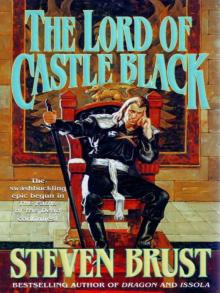 The Lord of Castle Black
The Lord of Castle Black To Reign in Hell: A Novel
To Reign in Hell: A Novel Five Hundred Years After (Phoenix Guards)
Five Hundred Years After (Phoenix Guards) The Book of Dzur: Dzur ; Jhegaala
The Book of Dzur: Dzur ; Jhegaala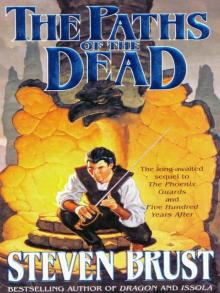 The Paths of the Dead
The Paths of the Dead Jhegaala
Jhegaala The Desecrator: A Tor.com Original
The Desecrator: A Tor.com Original Agyar
Agyar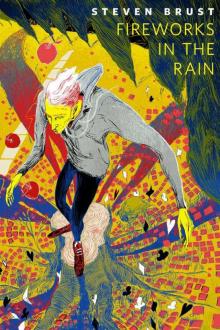 Fireworks in the Rain
Fireworks in the Rain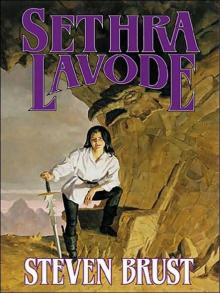 Sethra Lavode
Sethra Lavode The Book of Athyra
The Book of Athyra Yendi
Yendi Good Guys
Good Guys The Book of Jhereg
The Book of Jhereg Cowboy Feng's Space Bar and Grille
Cowboy Feng's Space Bar and Grille Sethra Lavode (Viscount of Adrilankha)
Sethra Lavode (Viscount of Adrilankha) My Own Kind of Freedom
My Own Kind of Freedom Dzur (Vlad Taltos)
Dzur (Vlad Taltos) The Lord of Castle Black: Book Two of the Viscount of Adrilankha
The Lord of Castle Black: Book Two of the Viscount of Adrilankha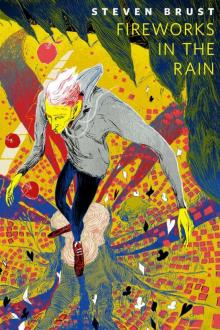 Fireworks in the Rain: A Tor.Com Original
Fireworks in the Rain: A Tor.Com Original To Reign In Hell
To Reign In Hell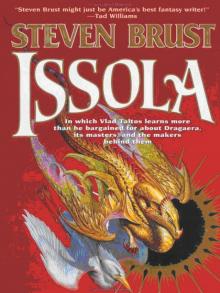 Issola
Issola Orca
Orca Issola (Vlad Taltos)
Issola (Vlad Taltos)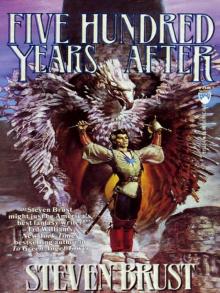 Five Hundred Years After
Five Hundred Years After The Phoenix Guards
The Phoenix Guards Taltos
Taltos![[Vlad Taltos 06] Athyra Read online](http://i1.bookreadfree.com/i1/03/24/[vlad_taltos_06]_athyra_preview.jpg) [Vlad Taltos 06] Athyra
[Vlad Taltos 06] Athyra Vallista--A Novel of Vlad Taltos
Vallista--A Novel of Vlad Taltos The Incrementalists
The Incrementalists![[Vlad Taltos 04] Taltos Read online](http://i1.bookreadfree.com/i/03/24/[vlad_taltos_04]_taltos_preview.jpg) [Vlad Taltos 04] Taltos
[Vlad Taltos 04] Taltos![[Vlad Taltos 03] Teckla (v 1.1) Read online](http://i1.bookreadfree.com/i1/03/27/[vlad_taltos_03]_teckla_v_1_1_preview.jpg) [Vlad Taltos 03] Teckla (v 1.1)
[Vlad Taltos 03] Teckla (v 1.1) The Book of Taltos
The Book of Taltos The Paths of the Dead (Viscount of Adrilankha)
The Paths of the Dead (Viscount of Adrilankha) Jhegaala (Vlad Taltos)
Jhegaala (Vlad Taltos) Hawk (Vlad)
Hawk (Vlad) Iorich
Iorich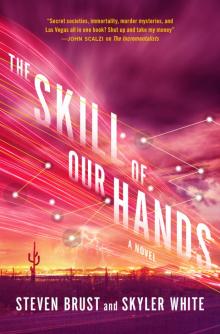 The Skill of Our Hands--A Novel
The Skill of Our Hands--A Novel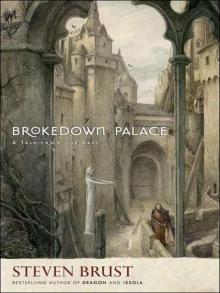 Brokedown Palace
Brokedown Palace Dragon (Vlad Taltos)
Dragon (Vlad Taltos) Dragon
Dragon Athyra
Athyra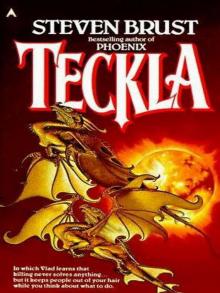 Teckla
Teckla Dzur
Dzur